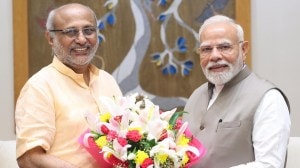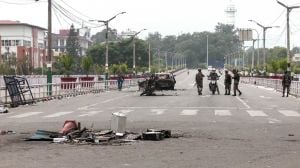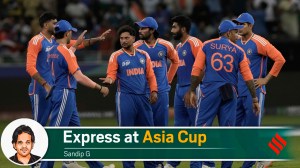Hold the celebrations
Since it is fashionable to be breathless with excitement speculating on the next round of Indo-Pak talks "at the highest level,"...

Since it is fashionable to be breathless with excitement speculating on the next round of Indo-Pak talks "at the highest level," let me also put in my two naya-paisa bit: not immediately. The technical committees on Transport and Communication set up by SAARC met at the Holiday Inn in Islamabad on January 5 and 6 and the Indian delegation consisted of five officials as against the one or two sent by other SAARC countries. Pakistan, of course, being the host, made it a largish affair. There was, on the margins of this meeting, some expected speculation whether SAARC officials may be meeting soon to set up something more spectacular in Kathmandu.
But at senior levels in New Delhi I spot a sense of annoyance at the manner in which Pakistan is lacing its public desire to resume a dialogue with an insistence that the Hurriyat somehow be roped in to complete the triangle.
A month ago, when the question arose of the Hurriyat leaders planning to visit Pakistan, the government of India knew that some had passports while others did not. The official position was that every Indian citizen is entitled to a passport. All that Hurriyat leaders had to do was to apply for passports. Having obtained the passports, they could go to any embassy, including the Pakistan High Commission, for their respective visas.
Don’t trouble trouble until trouble troubles you. What some of the Hurriyat, egged on by Islamabad, appears to have done is the exact opposite of the golden principle. They have placed in the public arena the fact that they do not possess passports. To make matters worse, political leaders in Pakistan have demanded that so and so be issued passports.
In this glare of publicity, if New Delhi does issue passports, Islamabad and elements in the Hurriyat will claim that some sort of a triangle is emerging. This New Delhi is not quite in the mood to accept. The Hurriyat have, in fact, denied themselves the documents they were entitled to.
Of course, stories will be floated of passports having being denied to them in the past. Kashmir has been an evolving story and in this evolution the centre’s mismanagement of it has also entailed denial of passports some years ago. During the Casablanca summit of the OIC in 1995, P.V. Narasimha Rao allowed Hurriyat leaders to participate. A cleverer move could not have been devised. I remember these leaders blushing with embarrassment when we captured them repeatedly on camera being chaperoned by Pakistani officials.
The difficulty with Islamabad is that it wishes the world community to notice its peace overtures, made from the rooftops, but not see the road blocks it sets up to halt progress. Having tired of its desire to "internationalise" Kashmir, it has now settled on the mantra of trilateral negotiations to settle the matter.
At a time when romance with Bill Clinton was at its height, there were powerful voices in New Delhi inclined to accept the reality that, whether we liked it or not, Kashmir had been "internationalised" and New Delhi’s diplomacy might as well proceed on that basis. There was, in this approach, a slight opening for the Clinton administration. All the assumptions may now have to be kept in abeyance until the new administration in Washington mellows for a year. Europe (NATO), former Yugoslavia, Middle East, Russia, China, Korean peninsula have all to be given a once-over before the gaze settles on South Asia. The Indian media, meanwhile, must keep a steady, balanced eye on the Taliban-Islamabad nexus so that the world knows of our dangerous neighborhood. We are living this crisis every day and it is not as if it erupts only when Christiane Amanpour materialises in Kabul wearing a hijab! Islamabad’s mantra of trilateralism has no takers in New Delhi.
But Islamabad has lost further credit by its unfortunate response to the act of terrorism at the Red Fort. "It is India’s internal affair", said Gen. Pervez Musharraf. Damage had been done by the time amends were made by the Pakistan foreign office. Remember the meeting in London’s Acton Town Hall on September 17? Mohajir, Sindhi, Pakhtoon and Balluch leaders declared from the same platform that the two-nation theory was dead, Partition a blunder and that all that the smaller states of Pakistan would strive for would be to weaken the ISI, Army and the Punjabi elite’s stranglehold on the state. They even talked of a Pakistan minus a "land-locked Punjab". Indian newspapers took scanty notice of the event.
Subsequently, a delegation came to New Delhi at the invitation of an Indian NGO to explain the resolutions passed at Acton. Oh, the howl of protests from Pakistan! How could New Delhi be part of this anti-Pakistan move. And now the blast at the Red Fort becomes an "internal" affair?
Islamabad will have to establish better credit. Everyone has begun to see through empty gestures for public consumption, which will be aplenty by the time the cease-fire deadline expires on Republic Day. If speculate one must, then the SAARC framework gives me a wide angle view where tiny but real progress can be made — as happened in Islamabad last week.
Islamabad’s mantra of trilateralism has no takers in New Delhi.
Photos



- 01
- 02
- 03
- 04
- 05



























